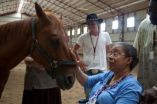(Press-News.org) COLUMBUS, Ohio—In the first study of its kind, researchers have determined that spending time with horses eases symptoms of Alzheimer's dementia.
A collaboration between The Ohio State University, an equine therapy center and an adult daycare center found that people with Alzheimer's were able to safely groom, feed and walk horses under supervision—and the experience buoyed their mood and made them less likely to resist care or become upset later in the day.
The small pilot study, which appears in the journal Anthrozoös, suggests that equine therapy—a treatment used today for children and teens who have emotional and developmental disorders—could work for adults, too.
Holly Dabelko-Schoeny, associate professor of social work at Ohio State, said that equine therapy could supplement more common forms of animal therapy involving dogs or cats and provide a unique way to ease the symptoms of dementia without drugs.
"We wanted to test whether people with dementia could have positive interactions with horses, and we found that they can—absolutely," Dabelko-Schoeny said. "The experience immediately lifted their mood, and we saw a connection to fewer incidents of negative behavior."
In addition to memory loss, people with Alzheimer's often experience personality changes, she explained. They can become depressed, withdrawn—even aggressive. As researchers look for a way to prevent or treat the disease, today's therapies are becoming more focused on how to ease the emotional burden for patients and their families.
"Our focus is on the 'now.' What can we do to make them feel better and enjoy themselves right now? Even if they don't remember it later, how can we help in this moment?" she said.
At the adult daycare center, a National Church Residences Center for Senior Health in downtown Columbus, clients normally partake in crafts, exercise and other activities to manage their dementia. For this study, sixteen of the center's clients who had Alzheimer's—nine women and seven men—volunteered to break with their regular routine.
Once a week, eight of the clients would remain at the center and pursue other activities while the other eight took a bus trip to the Field of Dreams Equine Education Center in Blacklick, Ohio. There, they visited with horses under the supervision of National Church Residences caretakers, as well as faculty and students from the College of Social Work and the College of Veterinary Medicine at Ohio State.
The clients visited the farm once a week for a month, so that every participant had four visits total. They groomed and bathed the horses, walked them, and fed them buckets of grass.
The four horses were chosen for their gentle dispositions and calmness when facing new people and new situations. All participate in therapeutic riding programs for children and teens at Field of Dreams.
The researchers saw obvious signs that the clients enjoyed their time on the farm: they smiled, laughed and talked to the horses. Even those who normally acted withdrawn became fully engaged in the experience.
There was a clear improvement in dementia-related behavior among the clients who visited the farm. To track behavior, the researchers used a scoring system called the Modified Nursing Home Behavior Problem Scale, in which staff at the center rated the frequency with which the participants fidgeted, resisted care, became upset or lost their temper on days they went to the farm or stayed at the center.
On a scale of zero to four—zero meaning the client never engaged in the problem behavior, and four meaning that they always engaged in it—scores for the participants who went to the farm were an average of one point lower than the scores for their peers who stayed at the center. So clients who visited the farm were, on average, better behaved throughout that day.
Through mouth swabs, the researchers also measured the levels of the stress hormone cortisol in the patients' saliva. For participants with less severe dementia, the researchers saw a rise in cortisol levels, possibly due to the "good stress" of being in a new situation.
There was one unexpected benefit, though: the therapy boosted physical activity. The clients all had physical limitations, but when presented with the horses, they were inspired to push the boundaries of those limitations.
Some clients who never wanted to leave their wheelchair asked for help in standing up; others who rarely wanted to walk stood up and walked unassisted, though a caretaker was always there to help them balance. The clients grew more physically active on each visit to the farm.
Family members reported that their loved one remained engaged with the experience even after returning home. One commented to researchers that her mother "would never remember what she did at the center during the day, but she always remembered what she did at the farm."
While much study has gone into animal therapy as a treatment for dementia, that work has focused on dogs and cats, which can easily be brought to community-based care centers. This is the first study to examine equine therapy for the same population.
And while horses could possibly be brought to community centers for outdoor therapy, a situation where clients could periodically visit an equine therapy center might be the best option, Dabelko-Schoeny said. That way they get the full experience of being on the farm.
Gwendolen Lorch, assistant professor of veterinary clinical medicine at Ohio State and co-author of the study, agreed that the country setting may have made the therapy more effective.
"I think another positive influence for these clients was the environment. They found the quietness and smells of the country very relaxing and restful. This was in contrast to their normal day care environment and their intercity dwelling," Lorch said. "It is difficult to tell what factors made this successful, but we do know that it was most likely a combination of events."
INFORMATION:
This study was funded by a private donor who wanted Ohio State to study the effectiveness of equine therapy for dementia. Now that the study is over, some of the clients' families have elected to continue to visit the farm.
Coauthors on the paper included Gary Phillips, senior biostatistician at Ohio State's Center for Biostatistics; Emily Darrough and Sara De Anna, both former master's students in social work who have since graduated; and Marie Jarden and Denise Johnson, both doctoral students in veterinary medicine.
Contact: Holly Dabelko-Schoeny, (614) 292-4378; dabelko-schoeny.1@osu.edu
Written by Pam Frost Gorder, (614) 292-9475; Gorder.1@osu.edu
Editor's note: Dabelko-Schoeny is best reached by email.
Caring for horses eases symptoms of dementia
People with Alzheimer's become calmer, happier after grooming horses
2014-05-05
ELSE PRESS RELEASES FROM THIS DATE:
Dementia diagnosis twice as likely if older adult has schizophrenia; cancer less likely
2014-05-05
INDIANAPOLIS -- Researchers from Regenstrief Institute and Indiana University who followed over 30,000 older adults for a decade have found the rate of dementia diagnosis for patients with schizophrenia to be twice as high as for patients without this chronic, severe and disabling brain disorder.
"Individuals with serious mental illnesses including schizophrenia appear to be living longer than earlier estimates suggested," said Hugh Hendrie, M.B., Ch.B., D.Sc., the geriatric psychiatrist who led the study. Dr. Hendrie is a Regenstrief Institute investigator, IU Center ...
Molecular tumor board helps in advanced cancer cases
2014-05-05
With accelerating development of personalized cancer treatments matched to a patient's DNA sequencing, proponents say frontline physicians increasingly need help to maneuver through the complex genomic landscape to find the most effective, individualized therapy.
In a paper published in the May 5 online issue of The Oncologist, researchers at the University of California, San Diego School of Medicine and Moores Cancer Center detail their experience evaluating 34 patients between December 2012 and June 2013 using a molecular tumor board – a new type of advisory group comprised ...
Researchers present findings on promising biomarker for esophageal cancer
2014-05-05
CLEVELAND – A new biomarker for esophageal cancer shows promise in improving screening for this deadly disease and its precursor, Barrett's esophagus.
Amitabh Chak, MD, of University Hospitals Case Medical Center's Seidman Cancer Center and Case Western Reserve University School of Medicine, presented findings today at Digestive Disease Week in Chicago in a research forum titled "Aberrant Vimentin Methylation in Esophageal Brushings: A Biomarker for Detecting Barrett's Esophagus and Esophageal Adenocarcinoma" (embargoed May 5, 9:15 am CT).
Dr. Chak and a research team ...
Study: Game developers say success hinges on more than just programming skills
2014-05-05
Aspiring game developers may want to bone up on their interpersonal skills. A forthcoming study from North Carolina State University and Microsoft Research finds that game developers need a suite of non-programming skills – including communication skills – that are considered less important in other fields of software development.
"We wanted to evaluate which skills are important to game developers versus other fields of software development," says Dr. Emerson Murphy-Hill, an assistant professor of computer science at NC State and lead author of a paper on the work. "These ...
High-strength materials from the pressure cooker
2014-05-05
This news release is available in German. The earth's crust works like a pressure cooker. Minerals typically do not form under standard conditions, but at high temperatures and pressures. However, an environment of extreme heat and pressure has been considered to be absolutely unsuitable for organic molecules. Scientists at Vienna University of Technology found out that under such seemingly hostile conditions, organic materials with remarkable material properties can be synthesized – for instance Kevlar, an extremely versatile high-performance material. The new technique ...
How does stress increase your risk for stroke and heart attack?
2014-05-05
Philadelphia, PA, May 5, 2014 – Scientists have shown that anger, anxiety, and depression not only affect the functioning of the heart, but also increase the risk for heart disease.
Stroke and heart attacks are the end products of progressive damage to blood vessels supplying the heart and brain, a process called atherosclerosis. Atherosclerosis progresses when there are high levels of chemicals in the body called pro-inflammatory cytokines.
It is thought that persisting stress increases the risk for atherosclerosis and cardiovascular disease by evoking negative emotions ...
Middle school students introduced to arboriculture topic
2014-05-05
GAINESVILLE, FL – A potential new sixth grade curriculum augmentation has been introduced to teach youth about an important topic: how to recognize structural defects in trees. "This highly important topic is rarely presented in middle or even high school," said author Laura Sanagorski. Sanagorski and coauthor George Fitzpatrick reported on their introduction to the new subject matter--which they tested in sixth grade science classes at three Florida middle schools--in HortTechnology.
Sanagorski and Fitzpatrick explained that trees in urban areas are more likely to develop ...
Younger adults benefit from gardening's moderate- to high-intensity activities
2014-05-05
SOUTH KOREA – People throughout the world enjoy gardening. The popular pastime can not only enhance home and community landscapes and provide low-cost food sources, the level of physical activity required also offers a multitude of health benefits. Studies have confirmed that engaging in gardening can lower cholesterol and blood pressure, and increase psychological well-being. The authors of a new study say that, although many studies have focused on the health benefits of gardening for older adults, research on different age groups is limited. A new study suggests that ...
Economics of high tunnels examined in southwestern United States
2014-05-05
LAS CRUCES, NM – Used throughout the world in horticulture and agriculture production, high tunnels are less complex and less expensive versions of greenhouses. The structures' passive heating and cooling capabilities can offer growers a cost-effective way to extend the growing season for high-value crops such as fruits, vegetables, and cut flowers. High tunnels can provide protection against some insects, early freezes, hail, and other weather events. A new study recommends the best high tunnel designs for growing lettuce and spinach during the winter season in the southwestern ...
Bioinformatics approach helps researchers find new uses for old drug
2014-05-05
BOSTON -- Developing and testing a new anti-cancer drug can cost billions of dollars and take many years of research. Finding an effective anti-cancer medication from the pool of drugs already approved for the treatment of other medical conditions could cut a considerable amount of time and money from the process.
Now, using a novel bioinformatics approach, a team led by investigators at Beth Israel Deaconess Medical Center (BIDMC) has found that the approved antimicrobial drug pentamidine may help in the treatment of patients with advanced kidney cancer. Described online ...
LAST 30 PRESS RELEASES:
Study: Discontinuing antidepressants in pregnancy nearly doubles risk of mental health emergencies
Bipartisan members of congress relaunch Congressional Peripheral Artery Disease (PAD) Caucus with event that brings together lawmakers, medical experts, and patient advocates to address critical gap i
Antibody-drug conjugate achieves high response rates as frontline treatment in aggressive, rare blood cancer
Retina-inspired cascaded van der Waals heterostructures for photoelectric-ion neuromorphic computing
Seashells and coconut char: A coastal recipe for super-compost
Feeding biochar to cattle may help lock carbon in soil and cut agricultural emissions
Researchers identify best strategies to cut air pollution and improve fertilizer quality during composting
International research team solves mystery behind rare clotting after adenoviral vaccines or natural adenovirus infection
The most common causes of maternal death may surprise you
A new roadmap spotlights aging as key to advancing research in Parkinson’s disease
Research alert: Airborne toxins trigger a unique form of chronic sinus disease in veterans
University of Houston professor elected to National Academy of Engineering
UVM develops new framework to transform national flood prediction
Study pairs key air pollutants with home addresses to track progression of lost mobility through disability
Keeping your mind active throughout life associated with lower Alzheimer’s risk
TBI of any severity associated with greater chance of work disability
Seabird poop could have been used to fertilize Peru's Chincha Valley by at least 1250 CE, potentially facilitating the expansion of its pre-Inca society
Resilience profiles during adversity predict psychological outcomes
AI and brain control: A new system identifies animal behavior and instantly shuts down the neurons responsible
Suicide hotline calls increase with rising nighttime temperatures
What honey bee brain chemistry tells us about human learning
Common anti-seizure drug prevents Alzheimer’s plaques from forming
Twilight fish study reveals unique hybrid eye cells
Could light-powered computers reduce AI’s energy use?
Rebuilding trust in global climate mitigation scenarios
Skeleton ‘gatekeeper’ lining brain cells could guard against Alzheimer’s
HPV cancer vaccine slows tumor growth, extends survival in preclinical model
How blood biomarkers can predict trauma patient recovery days in advance
People from low-income communities smoke more, are more addicted and are less likely to quit
No association between mRNA COVID-19 vaccination during pregnancy and autism in children, new research shows
[Press-News.org] Caring for horses eases symptoms of dementiaPeople with Alzheimer's become calmer, happier after grooming horses




